About the Quantitative History Webinar Series
The Quantitative History (QH) Webinar Series aims to provide researchers, teachers, and students with an online intellectual platform to keep up to date with the latest research in the field, promoting the dissemination of research findings and interdisciplinary use of quantitative methods in historical research. The QH Webinar Series, now entering its sixth year, is co-organized by the Centre for Quantitative History at the HKU Business School and the International Society for Quantitative History in partnership with the Hong Kong Institute for the Humanities and Social Sciences. The Series is now substantially supported by the Areas of Excellence (AoE) Scheme from the Research Grants Council of the Hong Kong Special Administrative Region, China (Project No. [AoE/B-704/22-R]).
清代江蘇士人的家世、仕進與社會流動 Family Background, Official Advancement, and Social Mobility of the Jiangsu Literati in the Qing Dynasty
In this Quantitative History Webinar, Qin Jiang will demonstrate that while the examination system indeed provided avenues for social mobility, the influence of family background was more evident in elevating descendants to higher examination degree.
Spousal Occupations in the Twentieth-century Yangtze Valley
During this Quantitative History Webinar, Ying Dai will explain that the spousal occupations are shaped by both marriage formation and post-marriage occupational decisions in the twentieth-century Yangtze Valley.
Doctoral Research Webinar: Weaving a Modern Workforce: How Female Industrial Pioneers Refined Women’s Economic Role in Japan
Xinxian Li, Research PhD Candidate of HKU Business School, examines how female industrial pioneers helped mediate this tension by prompting more women to participate in factory employment during the early industrialization in late 19th to early 20th century Japan.
Doctoral Research Webinar: Imports and Industrialization in China, 1876-1936
Xinhao Li, Research PhD Candidate of HKU Business School, examines the impact of import penetration in 1876-1892 on subsequent industrial development in China from 1896 to 1936.
兩千年中國經濟增長 China’s GDP over Two Millennia
Runzhuo Zhai of Renmin University of China constructs, for the first time, a decadal GDP dataset for China from 220 BCE to 1949 CE, which, when linked to adjusted post-1949 data based on official surveys, offers a clear view of China’s economic performance over the past two millennia.
Real and Nominal Belief in God: Evidence from Wills, England: 1300-1850
During this Quantitative History Webinar, Neil J. Cummins will explain how the religious behavior change occurs at the same time as the decline in aristocratic violence (Cummins (2017)), and like violence, precedes the behavior change of the poor by many centuries.




 January 29, 2026
January 29, 2026 16:00 - 17:30 (HKT)
16:00 - 17:30 (HKT)
